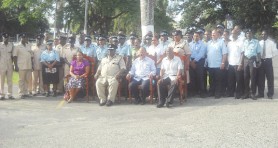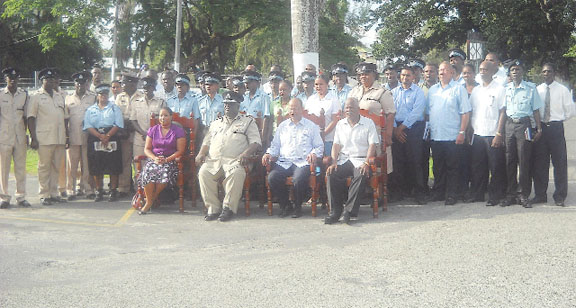One hundred and twenty-five police officers now have a better understanding of how to investigate and prosecute sexual offences cases, after taking part in a recent training seminar.

The closing ceremony for the seminar on the Sexual Offences Act 2010 took place yesterday at Police Officers’ Mess Annexe and the participants were urged to make good use of what they have learnt.
The seminar was held last week and saw police officers including court prosecutors benefiting from one day training sessions.
Police Commissioner Henry Greene in addressing the gathering said that ongoing training is essential particularly in the light of this new act pointing out the force has a very important role when it comes to investigation and prosecution.
He noted that it all starts at the level of the investigation. He said that in order for there to be good prosecution, there needs to be proper investigation. He noted that the force is often criticized in court for different reasons including statements not being properly taken. “Therefore ongoing training is so essential to the work of the police force, that we continue to train and never stop training,” he said.
He said police officers may have had training in relation to rape and other sexual offences but because of the Sexual Offences Act, there was need for retraining to address the different issues they would now have to face; more importantly, the issue of going to the court with statements.
According to Greene, prior to the seminar there was a session with the Director of Public Prosecutions (DPP) which targeted court prosecutors and the Criminal Investi-gation Department (CID); all the police divisions were involved.
He expressed hope that the participants will be able to transfer their new knowledge to their counterparts and that commanders will be able to foster the environment for such training to take place.
In delivering the feature address, Home Affairs Minister Clement Rohee said that the new sexual offences law is very challenging for law enforcement; the prosecutor; the magistracy and the judiciary. It will also be challenging for the complainants and the alleged offenders, he added.
In the light of these challenges, Rohee said, it would therefore require all those authorized under the law to enforce it.
The minister said that long hours were spent on creating the new law and the force having benefited from this training will hopefully be more proactive on these matters.
This act, he said has serious implications for the offenders, complainants, the police and our country. “It is for this and other reasons that the ministry considers it vital and necessary that the ranks of the Guyana Police Force be prepared by way of training to have to clear good grasp of the law to enable them to carry out their duties in accordance with this act,” he added.
The minister expressed appreciation to UNICEF for their collaboration and support adding that they are always pleased when training programmes are successful. This training programme, he added comes at a very important time for the force and it will subsequently be important for complainants and other stakeholders who will have to play a role in broadening the awareness.
Meanwhile Attorney-at-law, Della Britton in giving a training overview said that during the five days the sexual offences and the penalties attached to them were discussed. She said that in addition to this there were brief discussions on accompanying legislation such as the Criminal Law Offences Act, the Summary Jurisdiction Procedure Act and the Domestic Violence Act.
According to Britton, the ranks were engaged in discussions on the responsibility the police would bear to both the complainant and the accused during the investigation process as well as in the trial and co-trial.
The lawyer explained that the Sexual Offences Act is a revolutionary piece of legislation which would broaden the definition of traditional sexual offences such as rape and sexual assault. The act, she noted, seeks to prosecute and impose severe penalties on those who prey on children or vulnerable adults.
In keeping with the rights of the child, it seeks to protect children from sexual exploitation, she said, explaining that there are now penalties for persons who groom a child for sexual activity. The act specifically imposes life sentences for offences committed by an adult against a child under the age of 16.
She noted that this act makes it mandatory for police to investigate and report each and every allegation of sexual assault or abuse after which the findings are forwarded to the DPP for advice.
Failure by the police to carry out these instructions will result in disciplinary action being taken against them, she added.
Britton told the gathering that the ranks were also engaged in discussions on paper committals and procedures.
The preliminary inquiry sometimes lasts for several months, putting the complainant at risk of further abuse at the hands of the accused especially if the person was freed on bail. However the concept of paper committals, she explains seeks to shorten the time period from the accused first appearance in court to his or her committal to stand trial.
Under this procedure, the prosecution will be given 45 days after the accused first appears in court to gather all the evidence and present same to the presiding magistrate for consideration as to whether there is enough evidence to commit the accused to stand trial in the High Court, the attorney explained.
She said that as far as she is aware, no paper committals have been brought before the magistrate’s court of Guyana
.
This training seminar, Britton noted, was vital to the force as it continues to assist the government to stamp out sexual and domestic violence in Guyana. However, she pointed out, there is an urgent need for all to play a part in the eradication of this scourge of society.
Suleiman Braimoh, UNICEF representative in Guyana, said that it is the time for all to join hands to help fight sexual abuse and exploitation.
He said that he is looking forward to continued cooperation with the ministry.

